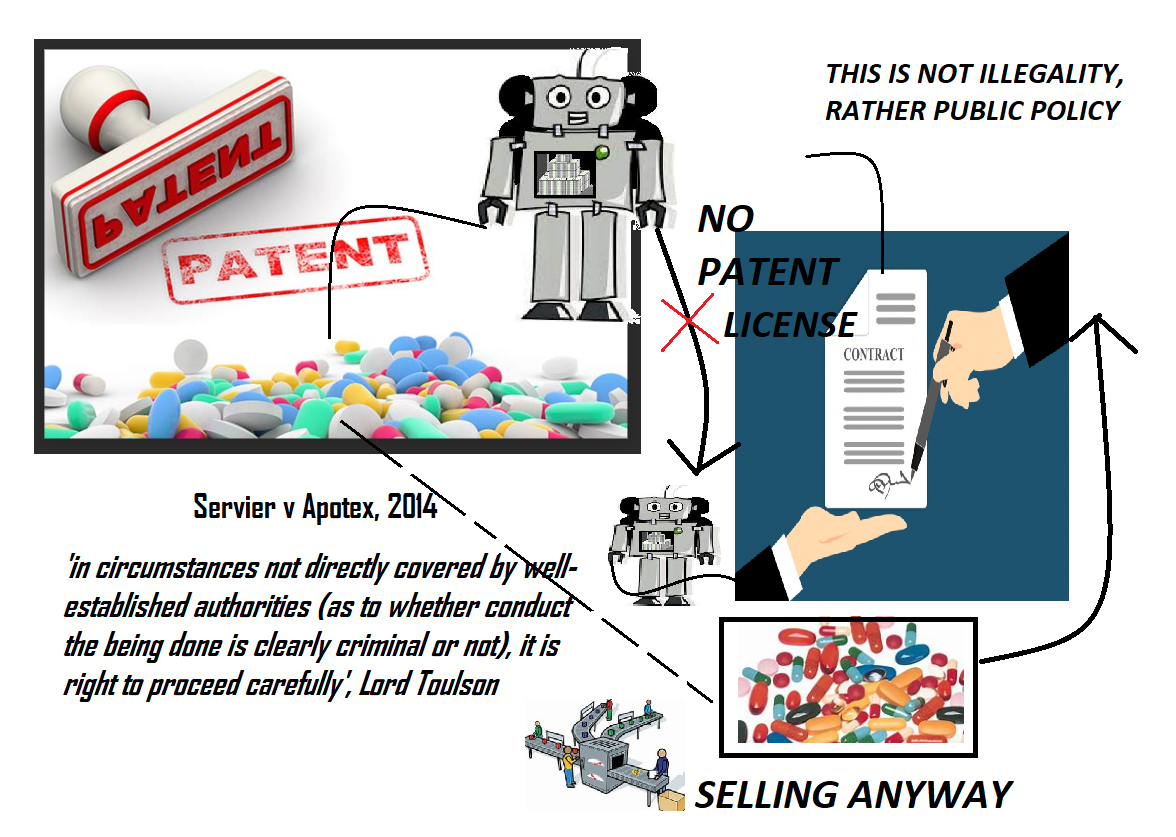Les Laboratoires Servier & Anor v Apotex Inc & Ors (Rev 1) [2014] UKSC 55 (29 October 2014)
Citation:Les Laboratoires Servier & Anor v Apotex Inc & Ors (Rev 1) [2014] UKSC 55 (29 October 2014)
Rule of thumb:In order for a contract to be deemed void based upon illegality for breach of criminal provisions, how clear do the criminal provisions have to be? in order for a contract to be void for illegality where criminal laws are invoked, this has to be clear or else the contract is presumed to be valid.
Background facts:
The facts of this case were that Servier had a patent for a blood pressure drug which was fully patented in Canada. This patenting process however was not fully completed by Servier in the UK however. Apotex, a competitor of Servier, manufactured the drug in Canada and sold this drug in the UK where the patenting process was not yet completed. Servier wanted Apotex to stop selling this blood pressure drug in the UK but Apotex refused to do so, meaning the matter went to Court.
Parties argued:
Servier argued that these sales should not take place in the UK on the basis of illegality because Apotex were not allowed to sell this in Canada. Apotex argued that the patenting process was not yet finished in the UK meaning that they were not breaking any laws selling this drug. Apotex further argued that illegality only applies where people are in clear breach of criminal law statutes, and this was very far from a clear breach of a criminal statute.
Judgment:
The Court upheld the arguments of Apotex - Apotex were allowed to continue selling this drug in the UK. The Court affirmed that if people are to argue that someone is breaching the principle of illegality, they have to be able to show clear statutory provisions that are being clearly breached. The Court affirmed that in this case the arguments about breaches of statute were too vague in order for the illegality principle to be upheld as being breached.

Ratio-decidendi:
‘Servier is unable to cite any precedent for saying that a claim for money otherwise payable under English law offends the doctrine of illegality if it arises from a contract involving the commission of a strict liability tort (whether as the object of the contract or in its performance). There are very few reported cases in which the doctrine of illegality has been applied to tort. In Brown Jenkinson & Co Ltd v Percy Dalton (London) Ltd [1957] 2 QB 621, the Court of Appeal held a contract to be unenforceable which had as its object the commission of the tort of deceit, but in that case Pearce LJ qualified his judgment by saying, at p 640, that in none of the cases cited before the court had a plaintiff failed where he was not fraudulently minded. Fraud for the purposes of deceit includes a false statement made in reckless disregard whether it be true or false, but there is no precedent for applying the doctrine of illegality to a tort of strict liability. In this case the protagonists are pharmaceutical companies who were involved in a bona fide commercial dispute about the validity of certain patents. Servier relies on the often quoted statement of Lord Mansfield in Holman v Johnson in which he said that "The principle of public policy is this; ex dolo malo non oritur actio." That statement made in 1775 remains a succinct statement of broad principle, but, as the cases over the last 240 years demonstrate, it does not provide a simple measuring rod for determining the boundaries of the principle. The case law is notoriously untidy. In deciding whether the principle should be applied in circumstances not directly covered by well-established authorities, it is right to proceed carefully on a case by case basis, considering the policies which underlie the broad principle. This has been said in the past by judges at the highest level’, Lord Toulson at 55-57.
'in circumstances not directly covered by well-established authorities (as to whether conduct the being done is clearly criminal or not), it is right to proceed carefully', Lord Toulson
Warning: This is not professional legal advice. This is not professional legal education advice. Please obtain professional guidance before embarking on any legal course of action. This is just an interpretation of a Judgment by persons of legal insight & varying levels of legal specialism, experience & expertise. Please read the Judgment yourself and form your own interpretation of it with professional assistance.

